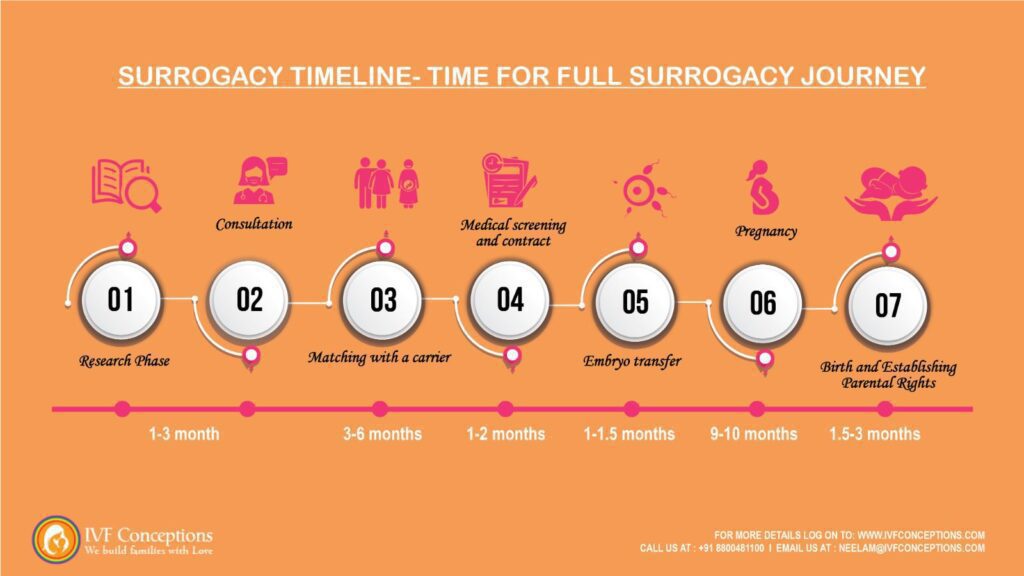Gestational Surrogacy in Florida: A Comprehensive Guide

Surrogacy in Florida offers a well-regulated, legally secure, and emotionally helpful route to parenting for people struggling with infertility issues. Florida has emerged as a ray of hope for intended parents looking to grow their families through surrogacy because of its progressive legal system, skilled surrogacy services, and supportive society.
Florida is home to a strong network of surrogacy organizations essential to the surrogacy procedure. By taking into account compatibility and shared objectives, these services assist in the pairing of intended parents with prospective surrogates.
Their experience guarantees a smoother and more fruitful surrogacy process. Florida is a friendly state for intended parents and surrogates since it has a clear legal framework for surrogacy.
Legally binding surrogacy agreements offer security and protection to all parties involved. It is possible to acquire pre-birth orders, which give intending parents parental rights even before the baby is born.
Key Highlights Of Surrogacy In Florida
Florida is a surrogacy-friendly state since it has a defined legal foundation for the practice. Legal recognition of surrogacy contracts ensures the protection of all parties involved.
The surrogate and intended parents’ obligations are spelled out in Florida surrogacy contracts. This legal agreement guarantees a simple and safe surrogacy process.
In Florida, intended parents can get pre-birth orders that give them parental rights even before the baby is born. This judicial action streamlines the parentage determination procedure.
The cost of surrogacy varies in Florida and includes agency fees, medical costs, and surrogate remuneration. For planning, it is essential to understand the financial factors. Surrogacy in Florida often costs between $100,000 and $210,000.
Get in touch for a Free Surrogacy Consultancy:
📲 +91-8800481100 ( WhatsApp, Line, Viber)
An Overview Of Surrogacy In Florida
 Understanding Surrogacy
Understanding Surrogacy
Surrogacy is a remarkable reproductive technology that brings together individuals who want to become parents and women who choose to become surrogates. The surrogate, often referred to as a surrogate mother, carries a pregnancy on behalf of intended parents, individuals, or couples who may be unable to do so themselves due to medical or other reasons.
Navigating Florida Surrogacy Law
Florida’s progressive surrogacy laws make it a sought-after destination for those embarking on the surrogacy journey. The state supports both gestational surrogacy and traditional surrogacy, offering prospective parents options that suit their needs.
- Gestational surrogacy involves the implantation of an embryo created from the genetic material of the intended parents or donors into the surrogate. The surrogate has no genetic connection to the child, simplifying legal matters.
- Traditional surrogacy entails the surrogate providing her own eggs for conception, which can introduce legal complexities as she may have a genetic connection to the child.
Who Can Pursue Surrogacy in Florida?
Florida’s surrogacy laws are inclusive, allowing a broad spectrum of individuals to explore surrogacy as a means to parenthood. This includes:
- Heterosexual couples dealing with infertility issues.
- Same-sex couples seeking to build their families.
- Single individuals with a strong desire to become parents.
Becoming a Surrogate in Florida
The journey begins with the decision to become a surrogate. If you’re considering this selfless act, it’s crucial to find a reputable agency, clinic, or intended parents who align with your values and goals.
As a surrogate, you’ll play an integral role in helping others realize their dream of parenthood.
Florida is a surrogacy-friendly state for those who meet the legal requirements because it is one of the few states with explicit statutes allowing both traditional and gestational surrogacy. However, due to specific limits and constraints, not everyone can pursue surrogacy in Florida.
Florida supports surrogacy’s diversity, inviting all couples—regardless of gender or sexual orientation—to use it to fulfill their parental aspirations. In vitro fertilization (IVF) is frequently used in Florida surrogacy procedures.
In vitro fertilization (IVF) entails the laboratory fertilization of an egg with sperm, followed by the transfer of the resultant embryo to the surrogate’s uterus for pregnancy. High success rates and precise control are features of this approach.
Florida has strict laws that safeguard the rights of both intended parents and surrogates during the surrogacy procedure. The surrogate may or may not be genetically linked to the child, and Florida surrogacy rules permit both gestational and conventional surrogacy.
Only if the intended parents are married and older than 18 are surrogacy contracts enforceable.
Surrogacy Laws In Florida
You’re in the right place if you’re thinking about surrogacy in Florida. Similar to surrogacy in many other jurisdictions, surrogacy in Florida is governed by particular surrogacy regulations, therefore it’s critical that you comprehend the legal procedure involved before considering a surrogacy in Florida.
The surrogacy process in Florida is well-regulated and open to both intended parents and surrogates. Florida’s surrogacy regulations are created to safeguard the rights of both parties throughout the procedure, ensuring a quick and secure surrogacy process for everyone involved.
Florida is undoubtedly a surrogacy-friendly state for those who are interested in this family-building procedure because of these rules.

Is surrogacy legal in Florida?
Yes. According to Florida law, gestational surrogacy, and traditional surrogacy are both legal ways for intended parents to grow their families.
According to Florida Statute 63.213, traditional surrogacy (often known as “pre-planned adoption”) is permitted when either (1) the surrogate uses her own egg to establish a pregnancy or (2) neither of the intended parents is genetically related to the kid. The surrogate may withdraw her agreement to the adoption up to 48 hours after birth if she shares a genetic relationship with the kid.
Florida Statute Chapter 742 governs the practice of gestational surrogacy. In order to qualify for a gestational surrogacy arrangement, you must share no genetic ties with the surrogate or at least one of the intended parents.
Is Florida a friendly state for paid surrogacy?
Yes. In Florida, intended parents may cover reasonable costs for gestational surrogacy as well as traditional surrogacy, including living expenses, medical, psychological, and psychiatric costs, as well as compensation for inconvenience, discomfort, and medical risk.
Are surrogacy agreements compensated or altruistically enforceable in Florida?
Yes. Despite the fact that Florida surrogacy is an unresolved legal issue, conventional contract law applies to the contract clauses’ enforceability. However, the court may decide not to enforce a clause in a contract that contains a provision that is unconstitutional or against public policy.
International surrogacy guide:
Top 4 cheapest countries for surrogacy
Best Countries for Surrogacy 2024- Top International Destinations
Risks of international surrogacy
Global International Surrogacy Options
IVF Conceptions Surrogacy Prices & Plans ( in 2024)
How Much Does Surrogacy Cost In Florida?
 How much do surrogates get paid in Florida?
How much do surrogates get paid in Florida?
In Florida, surrogacy expenses often range from $100,000 to $210,000. Due to varying medical expenditures at the fertility clinic, surrogacy costs, legal charges, and other unforeseen incidentals connected with the surrogacy procedure, the cost of surrogacy varies greatly.
We will examine each component of the surrogacy process in order to better understand why it is so expensive.
Surrogacy Agency Fees
Both individuals seeking to expand their families and the surrogates who carry the child to term are served by surrogacy agencies.
A surrogacy agency has qualified staff members who offer case management, counselling, and other services.
In Florida, a surrogacy agency might run you anywhere from $20,000 to $32,000 on average.
Medical Expenses
Medication used during surrogacy increases the likelihood that an embryo transfer will be successful by helping to prepare the uterine lining for implantation. In Florida, the cost of medical testing, drugs, and embryo transfer for surrogacy typically ranges from $7,800 to $14,000.
Prenatal Care and Delivery
To guarantee the health and safety of both the unborn child and the surrogate bearing the child, as with any pregnancy, the surrogate will be examined. In Florida, the average cost of prenatal care and delivery for a surrogate is between $12,500 – $29,000.
Depending on a number of factors, such as whether a C-section is being performed and any other unforeseen medical requirements for the surrogate or the child, the costs associated with the delivery of the child may vary.
Lawyer Expenses
As a crucial part of the surrogacy procedure, surrogate attorneys are well worth the cost because they provide you with the assurance that everything is being done legally.
Your attorney will supervise the legal procedure if your surrogate party resides outside of Florida in order to ensure that any applicable out-of-state laws are also followed.
In Florida, surrogacy legal services typically cost between $6,900 and $13,000.
Surrogate Expenses/How much do surrogates get paid in Florida?
The surrogate’s compensation costs also include what is known as a base payment, which in Florida typically varies from $36,000 to $50,000.
A monthly stipend and other benefits are also frequently given to surrogates during the surrogacy procedure.
Depending on the specific set of circumstances, the total cost of the surrogacy procedure can vary greatly.

Surrogacy Process in Florida for Intended Parents
In Florida, parents who are unable to conceive or carry a child on their own have a viable and protected choice in surrogacy. Intentional parents are supported and protected throughout the surrogacy process by rules and regulations that have been enacted in Florida. The essential actions and ideas for prospective parents are listed below:
Process of Surrogacy
-
Choose A Surrogacy Agency
Select a reliable Florida-based surrogacy agency. These organizations can assist you in finding a suitable surrogate, organizing the medical and legal parts of the process, and offering counselling all along the way.
-
Selecting A Surrogate
Your search for a surrogate who satisfies the necessary requirements, such as age, medical history, and past successful pregnancies, will be aided by the surrogacy agency. You might get the chance to speak with possible surrogates to make sure you click.
-
Legal Agreements
Legal agreements are an essential component of the surrogacy procedure. You and the surrogate will collaborate with independent legal counsel to create agreements that specify requirements, privileges, and obligations. These agreements frequently address matters including compensation, medical choices, and parental rights.
-
Medical Procedures
The medical procedures can start after the legal agreements are established. Typically, this entails in vitro fertilization (IVF), where embryos are developed using the genetic material of the intended parents or donor material. After that, the embryos are placed in the surrogate’s uterus.
-
Prenatal Care
Throughout the entire pregnancy, the surrogate will receive complete prenatal care. You, the intended parents, have the option of participating in this procedure and going to the doctor’s appointments.
-
Birth of The Baby and Pre-Birth Order
You can seek a pre-birth order in Florida, allowing your name to be added to the child’s birth certificate as soon as they are born. By establishing your parental rights through this legal document, adoption procedures are not necessary.
Florida is a well-liked location for surrogacy services since it provides intended parents with a supportive legal environment. To guarantee a smooth and successful surrogacy journey, it is imperative to collaborate with knowledgeable specialists, including legal counsel, medical experts, and surrogacy companies.
 Finding a surrogate mother in Florida
Finding a surrogate mother in Florida
- Organizations that match intended parents with surrogate moms are known as surrogacy agencies. They manage the legal and medical parts of the process, have a network of pre-screened surrogates, and offer assistance all along the way.
- Online portals exist where prospective surrogates and intended parents can communicate with one another. Profiles containing details about the surrogates and their preferences are frequently seen on these websites.
- Surrogacy attorneys can assist you in finding a surrogate and through the legal requirements of surrogacy. They might know surrogates or be able to recommend you to organizations or websites that can help you find a surrogate.
- Personal Relationships: Some people locate surrogates through friends or relatives who are ready to carry out their pregnancy. This is referred to as “traditional surrogacy,” in which the surrogate and the child may share genetic ancestry.
- Fertility Clinics: Many fertility clinics either maintain a list of prospective surrogates or have partnerships with surrogacy services. They can help you find a surrogate and offer the required medical assistance.
Additional guides for surrogacy in the USA:
Surrogacy In the USA is Made Easy and Affordable.
How Much do Surrogacy Agencies Charge in the USA?
How Much Does Surrogacy Cost in USA ( 2024)?
Why USA Couples Should Do Surrogacy In Georgia, Europe?
Surrogacy Financing Options For Intended Parents
Why Surrogacy Costs So High And How To Manage It?
Conclusion
When considering surrogacy in Florida, it’s important to consult with legal and medical professionals frequently, keep an open line of communication with your surrogate, and put everyone’s health first. Surrogacy in Florida can provide a practical and safe way to realize one’s parental ambitions with the correct support and services.
Frequently Asked Questions – Surrogacy in Florida
1.  What is surrogacy in Florida?
What is surrogacy in Florida?
Surrogacy in Florida refers to the legal process where a woman, known as a surrogate or gestational carrier, carries and gives birth to a baby for another person or couple, known as the intended parent(s).
2. How does surrogacy work in Florida?
In Florida, surrogacy is permitted and governed by state laws. The intended parents and surrogate must enter into a surrogacy contract outlining their rights, responsibilities, and expectations during the surrogacy journey. The surrogate mother in Florida carries and delivers the child, and upon birth, the intended parents become the legal parents of the child.
3. Is surrogacy legal in Florida?
Yes, surrogacy is legal in Florida. The state has surrogacy-friendly laws that protect the rights of both the surrogate and the intended parents. These laws ensure a smooth surrogacy process and provide a legal framework for the establishment of parental rights.
4. How do I become a surrogate in Florida?
To become a surrogate in Florida, you can start by researching surrogacy agencies or clinics that specialize in gestational surrogacy. These agencies will guide you through the entire process, including the screening, matching, and legal aspects of becoming a surrogate mother in Florida.
5. What is the difference between gestational surrogacy and traditional surrogacy?
In gestational surrogacy, the surrogate mother in Florida carries an embryo created using the intended parents’ egg and sperm or donated gametes. In traditional surrogacy, the surrogate is the biological mother of the child conceived using her own egg or an egg from a donor.
6. What are the surrogacy laws in Florida?
Florida has specific surrogacy laws that regulate the process and protect the rights of all parties involved. These laws address issues such as parental rights, pre-birth orders, and the legalities of surrogacy arrangements. It is essential to consult with a surrogacy attorney in Florida to fully understand these laws and ensure compliance throughout the surrogacy journey.
7. Can intended parents be genetically related to the child in surrogacy?
Yes, in gestational surrogacy, one or both intended parents can be genetically related to the child. The embryo used for the surrogacy process can be created using the intended parents’ egg and sperm, or donor gametes can be used if needed.
General FAQs for Surrogacy in the USA
Q1. What is the process of surrogacy in the USA for intended parents?
Ans. The surrogacy process in Florida for intended parents involves multiple steps, starting with a consultation to discuss your story and questions. Working with an experienced agency Surrogacy provides guidance through milestones like choosing an agency, finding a surrogate, medical screening, and legal contracts.
Q2. How much does surrogacy in the USA cost?
Ans. The cost of surrogacy in the USA varies depending on the program you choose. The cost of surrogacy starts at $150,000 to $200,000 based on the specific services needed and the compensation of the surrogate mother and egg donor. For low-cost surrogacy, it is advised to consider “independent surrogacy or private surrogacy”, which costs less but requires more time and management.
Q3. What are some affordable surrogacy options?
Ans. Affordable surrogacy options are:
- Opting for independent surrogacy arrangements.
- Using a surrogate mother within the family or friend circle.
- Considering the international surrogacy countries with affordable, low-cost surrogacy programs like Mexico, Colombia, Argentina, Georgia, and Ukraine.
Q4. What are the requirements for becoming a surrogate mother in the USA?
Ans. The requirements for becoming a surrogate mother are:
- To become a surrogate mother, you must meet certain criteria.
- You should have delivered a child of your own and be parenting at least one child.
- Uncomplicated pregnancies and deliveries are necessary, as documented by medical records.
- Age requirements are between 21 and 44 years old.
- The Body Mass Index (BMI) is typically no higher than 33.
- Surrogates should be citizens, legal residents, or legal immigrants of the United States.
- medically and psychologically in sound condition.
Q5. Can you help us find a low-cost surrogate mother?
Ans. Yes, we have been working in the international surrogacy domain for 13 years and have good networks of fertility clinics and surrogacy agencies globally, that are trusted to offer world-class services. We have long expertise and experience in the best and most legal international surrogacy countries.
If you’d like to learn more about IVF, Egg Donation, or surrogacy services globally, check out the rest of our website at IVF Conceptions. We offer legally secure and affordable surrogacy consulting services for FREE.
Contact us now for a Free International Surrogacy consultation!
Get in touch for a Free Surrogacy Consultancy:
📲 +91-8800481100 ( WhatsApp, Line, Viber)

 Understanding Surrogacy
Understanding Surrogacy
 Finding a surrogate mother in Florida
Finding a surrogate mother in Florida What is surrogacy in Florida?
What is surrogacy in Florida?